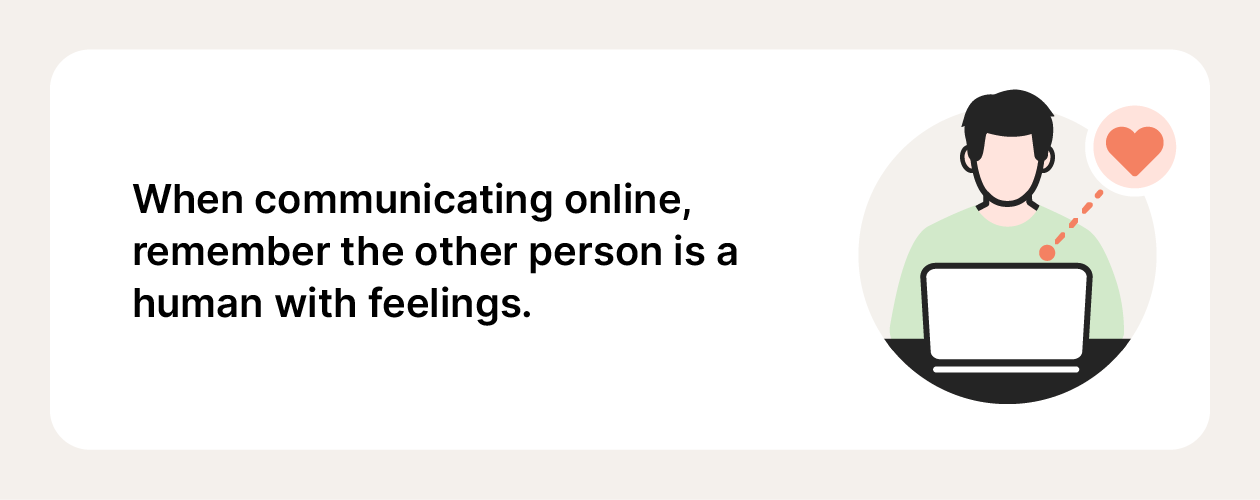
Netiquette is the correct or acceptable way of using the internet and behaving online. Maintaining a positive online presence is just as important as your offline persona, for your benefit and others. Unfortunately, not everyone behaves well online. For better peace of mind, get Norton™ 360 with LifeLock™ Select, which offers powerful protection against scams, fraud, and other online threats.


Netiquette refers to the acceptable rules for behaving appropriately online. The word netiquette is a portmanteau of “network” and “etiquette.” It is a set of best-practices and guidelines that promote respect among users and internet safety.
While social etiquette has evolved over time, internet etiquette is fairly new. Netiquette rules and principles have developed to help keep the web a safer and more inviting place. Understanding netiquette guidelines fosters healthier digital interactions and a more positive online environment, which is increasingly important as we spend more time on the web.
Just like we want to put our best foot forward when we’re out in the real world, we should strive to be good citizens in the digital world, which is the very definition of netiquette. People may feel unencumbered and anonymous online, and they may behave worse as a result. But you never know who you’re interacting with, or who might be impacted by what you do, so it’s important to observe proper netiquette guidelines both for your sake and for others.
This article will cover the rules of netiquette and how to conduct yourself online. And we'll also discuss some of the consequences of poor netiquette.
The golden rule of netiquette is the same as the golden rule itself: treat others online the way you would like to be treated yourself. When there’s a screen in front of you, you can forget you’re interacting with real people, and you may be tempted to act more abrasively. But don’t fall into that trap. Behaving courteously online, the same way that you would in person, is a good start.
When online, don't forget that you’re often communicating with real people, who have real feelings. There’s a human behind the words you’re reading. Online, it’s often too easy to shoot back a negative comment, because you’re looking at text on a screen rather than looking someone in the eye.
When you’re texting or emailing, you can’t pick up on the facial expressions, body language, or tone of voice of those you’re talking to, which can make it easy to misread the context of their words. Meaning can also get lost when auto-correct changes text or speedy typing leaves out critical words.

There’s something about being anonymous and faceless that ignites a feeling of freedom to say things you would never say in person. While this kind of cyber behavior can feel exhilarating, actions online can have real-world consequences.
Copying someone’s work could violate copyright laws, and lying about someone’s actions could harm their reputation or be considered libelous. On a personal level, you could alienate yourself from friends, family members, or colleagues because of something you’ve written.
Just as in face-to-face interactions, what you say and do online reflects on your character and affects how others perceive you. Whether you share something anonymously or not, always think before acting online and try to maintain the same standards of behavior on the internet as you would in any public or real-world setting.
Knowing where you’re writing—and your audience—is essential, because online forums and platforms all have their own rules. What’s acceptable for one group may go against the norms or rules of another.
Communicate in a way that’s appropriate for the specific audience of the platform you’re on. For example, your meat recipe blog subscribers might love your special chicken recipe, but if you post it on a vegan chat group, you’ll likely disgust other members. And the caustic tone you use on the chat group with your friends is likely not appropriate for work communications.
In today’s world, with so many devices and media competing for our attention, information overload can often be overwhelming. It’s important to respect people’s time and keep your online communication succinct.
And remember that your communications—whether emails, online chats, photos, or videos—take up storage space. Bombarding mailing lists with large files or unnecessary communications might not just annoy recipients; it might also leave their devices with less space for files they really need.